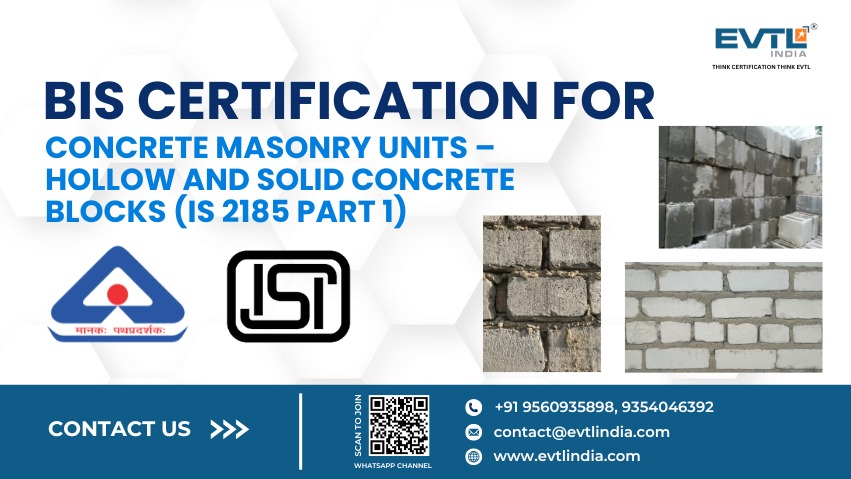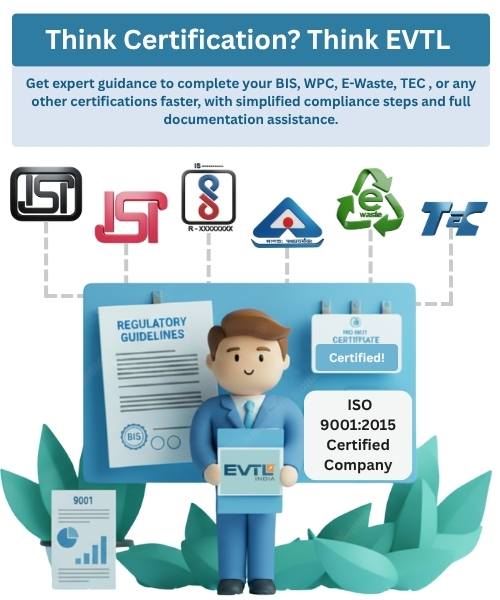Get A Quote
BIS Certification for Concrete Masonry Units – Hollow and Solid Concrete Blocks (IS 2185 Part 1)

Introduction
Concrete masonry units, available in both hollow and solid forms, play an important role in modern construction. These blocks are widely used in building projects because they are strong, durable, and versatile. According to IS 2185 (Part 1): 2005, specific guidelines are set for their design and performance to ensure quality, strength, and long-lasting reliability. Due to these qualities, concrete blocks have become one of the most commonly used materials in both residential and commercial construction.
Concrete blocks are available in two main types: hollow blocks and solid blocks. Hollow blocks are mostly used in walls and partitions, while solid blocks are used for structural purposes like foundations and load-bearing walls. Both types play an important role in the construction industry because they are strong, durable, fire-resistant, and easy to use.
Getting BIS (Bureau of Indian Standards) certification is essential for these blocks. This certification ensures that the concrete blocks follow the quality, safety, and performance standards set by Indian regulations. It gives builders and consumers confidence that the blocks have been tested properly and meet the required benchmarks. It also helps manufacturers and importers comply with Indian market rules and regulations.
With rapid growth in construction and infrastructure development, the demand for concrete blocks is rising. Their eco-friendly, cost-effective, and reliable nature makes them a preferred choice for many building projects.
Types and Uses of Concrete Blocks
Hollow Blocks: Commonly used in partition walls, boundary walls, and as filler material in larger structures.
Solid Blocks: Best suited for load-bearing walls, foundations, and other structural support applications.
Versatility: Widely used in residential houses, commercial buildings, and large infrastructure projects.
Overview of IS 2185 (Part 1)
IS 2185 (Part 1): 2005 is an Indian Standard that defines the requirements for concrete masonry units, which include both hollow and solid concrete blocks. In simple terms, it lays down the rules for the quality, strength, and durability of these blocks.
This standard explains the physical properties, sizes, and testing methods to ensure that concrete blocks meet the necessary benchmarks for safe and reliable use in construction.
Manufacturers who wish to obtain BIS certification must strictly follow the guidelines of IS 2185 (Part 1): 2005. Compliance with this standard is not only important for market approval but also for meeting legal requirements in India.
In essence, IS 2185 ensures that concrete blocks provide structural strength, safety, and overall quality, which directly impacts the durability and reliability of buildings and infrastructure.
Key Features of IS 6072
Material Standards: Specifies the type and quality of raw materials required for making concrete blocks.
Performance Criteria: Describes essential properties like strength, durability, and water absorption to ensure proper use in construction.
Safety Requirements: Ensures that the blocks meet safety norms to reduce risks during building and usage.
Testing & Verification: Defines testing methods to check whether the blocks comply with the set standards and performance levels.
Key highlights
Tests Required for Concrete Masonry Units – Hollow and Solid Concrete Blocks (IS 2185: Part 1)
Surface Texture and Finish – The outer look and smoothness of the block.
General – The overall features and basic requirements.
Dimensions – The length, width, and height measurements of the block.
Block Density – The weight of the block in relation to its volume.
Compressive Strength – The ability of the block to handle pressure or load without breaking.
Water Absorption – The amount of water the block can take in.
Note:
For complete details about the process of getting a BIS ISI Certification, please visit:
Visit :
Procedure for Domestic Manufacturer
Procedure for Foreign Manufacturer
Timeline for BIS Certification
The estimated time required to get BIS certification for Concrete-Based Building Products (Concrete Masonry Units – Hollow and Solid Concrete Blocks) under IS 2185 (Part 1): 2005, for using the ISI mark, is as follows:
Indian Manufacturers – Usually takes around 30 days
Foreign Manufacturers – Usually takes around 180 days
Advantages of BIS Certification
Getting BIS certification provides many benefits, such as:
Case Study
In a recent infrastructure project, a leading construction company used BIS-certified concrete masonry units for building a high-rise structure. The certification guaranteed that the blocks met strict quality standards, ensuring the project’s safety and long-lasting strength. The company shared that using these certified blocks made the approval process smoother and increased client satisfaction, as the material complied with IS 2185 (Part 1): 2005.
Conclusion
BIS certification for concrete masonry units not only confirms compliance with Indian standards but also improves market access and product trust. The implementation of IS 2185 (Part 1): 2005 guarantees product quality and ensures that all rules and regulations are properly followed. EVTL India provides expert consultancy to manufacturers seeking BIS certification. With their knowledge and simplified process, they help businesses achieve certification smoothly, ensuring better quality and easier entry into the market.
For the latest updates and complete guidance, stay connected with EVTL India to keep your products compliant and of the best quality.
Frequently Asked Questions
Q1. What is BIS certification?
BIS certification confirms that a product follows the quality and safety standards set by the Bureau of Indian Standards (BIS).
Q2. How can I apply for BIS certification?
You can apply through the official BIS website or approach a BIS-authorised certification agency for detailed guidance.
Q3. Is BIS certification compulsory for all products?
No, it is not required for every product. However, for some products like concrete masonry units, BIS certification is mandatory to sell them in the Indian market.
Q4. How does BIS certification benefit MSMEs?
For MSMEs, BIS certification boosts product quality, builds customer trust, and improves competitiveness in the market.
Q5. Which standard applies to concrete blocks?
The applicable standard is IS 2185 (Part 1): 2005, which covers both hollow and solid concrete masonry blocks.
You can contact us via email at contact@evtlindia.com or by phone at 9560935898. Feel free to get in touch with us anytime for the support you need.
BIS ISI Mark Certification | BIS-CRS Certification | EPR E-WASTE | WMI Registration | BIS Certification For Footwear | TAC & IMEI Registration | BIS FMCS Page | TEC | EPR Registration for Plastic Waste Management | EPR Registration for Battery Waste Management | EPR Registration For Used Oil | EPR Registration for Tyre Waste Management | WPC ETA License | NOC | LMPC | Legal Metrology | Trademark Registration | ISO Certification | EMI-EMC Test | Toys | GEM Registration | EPCG Scheme | LM 79 & LM 80 | ROHS Approval | CDSCO Registration | RF Testing | IP Rating Test | MSME & NSIC Registration | BIS Certificate for Conformity | BIS Scheme-X Certification | Hallmark Registration | Laboratory Recognition Scheme | ECO-MARK Certification | RDSO | CE Certification | List Of Equipments | US FDA Registration | Lab Setup & Lab Equipment |
Free Call Back
Why Choose EVTL INDIA
Expertise in Indian Regulatory Standards
End-to-End Support
Trusted by Top Indian & Global Brands
Fast Processing & Transparent Pricing
Strong Liaison with Indian Authorities
Company Profile



















